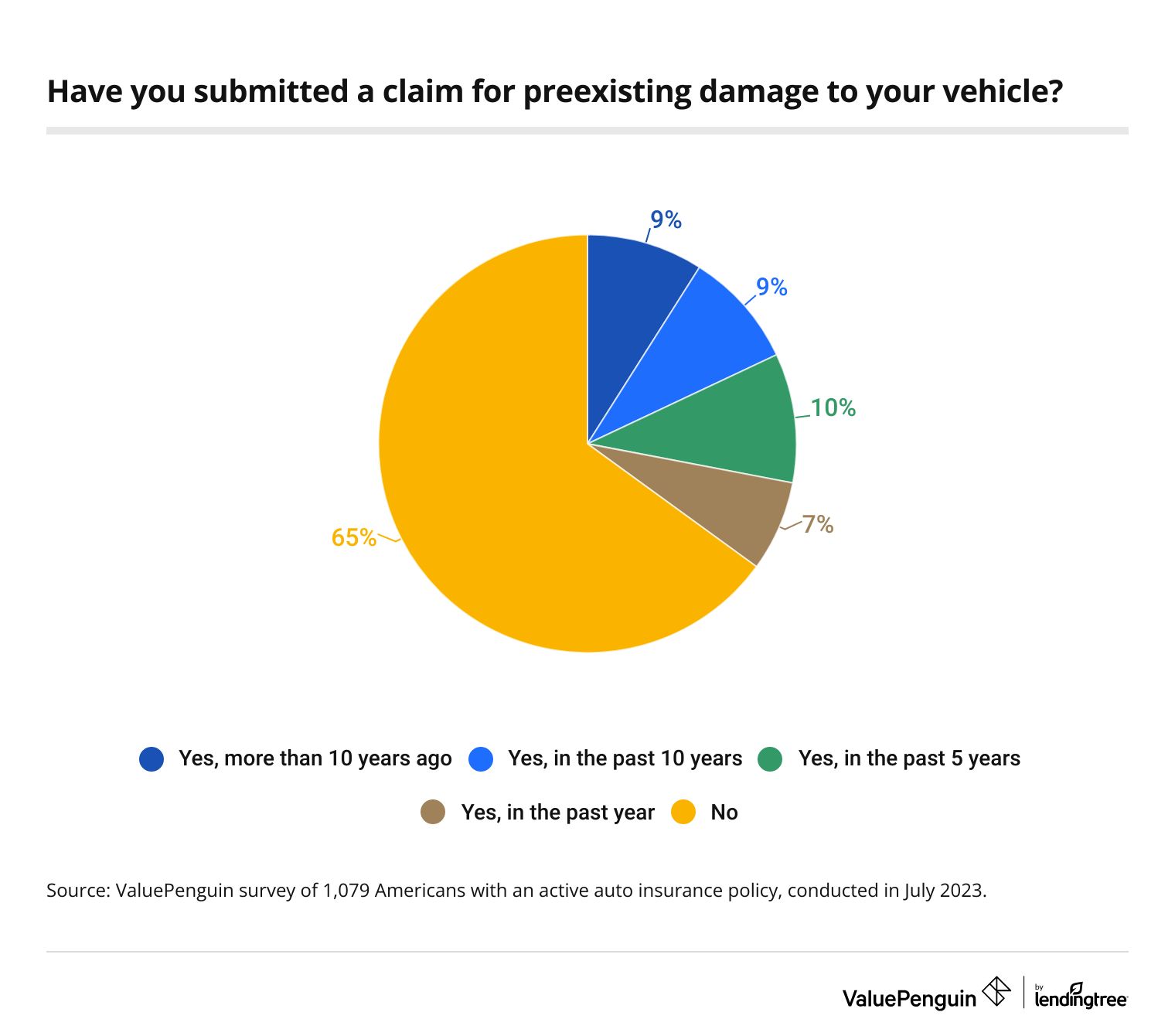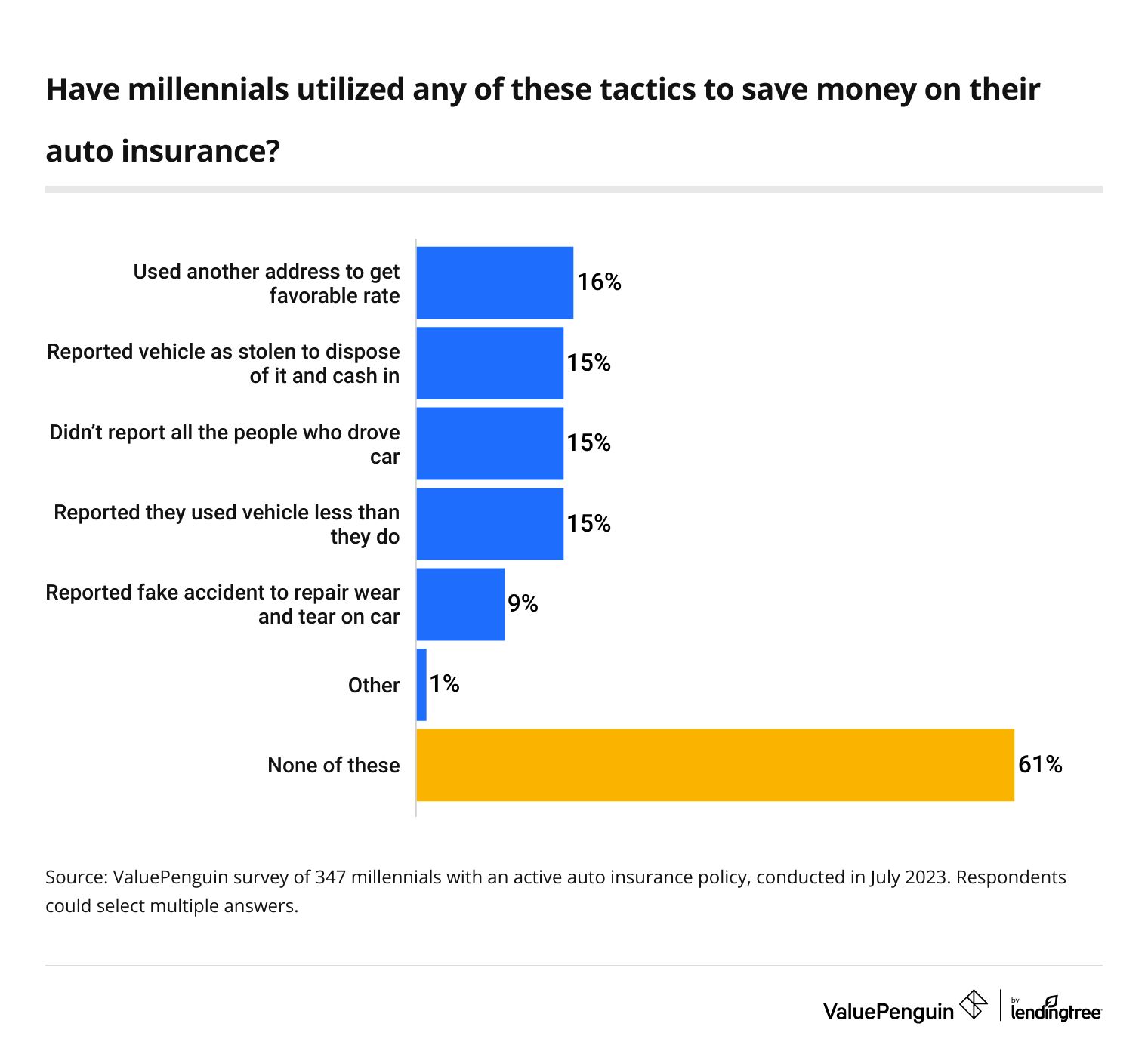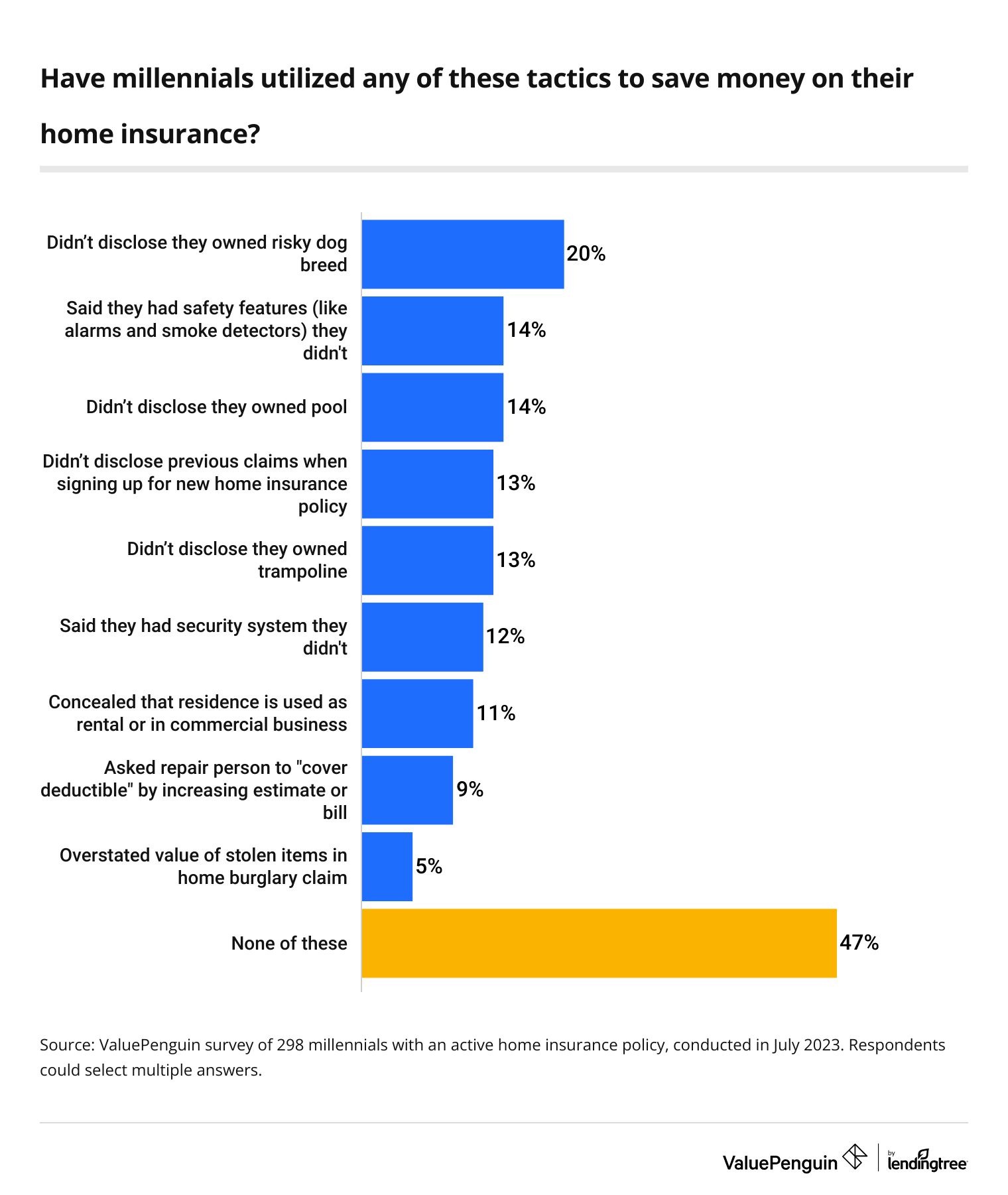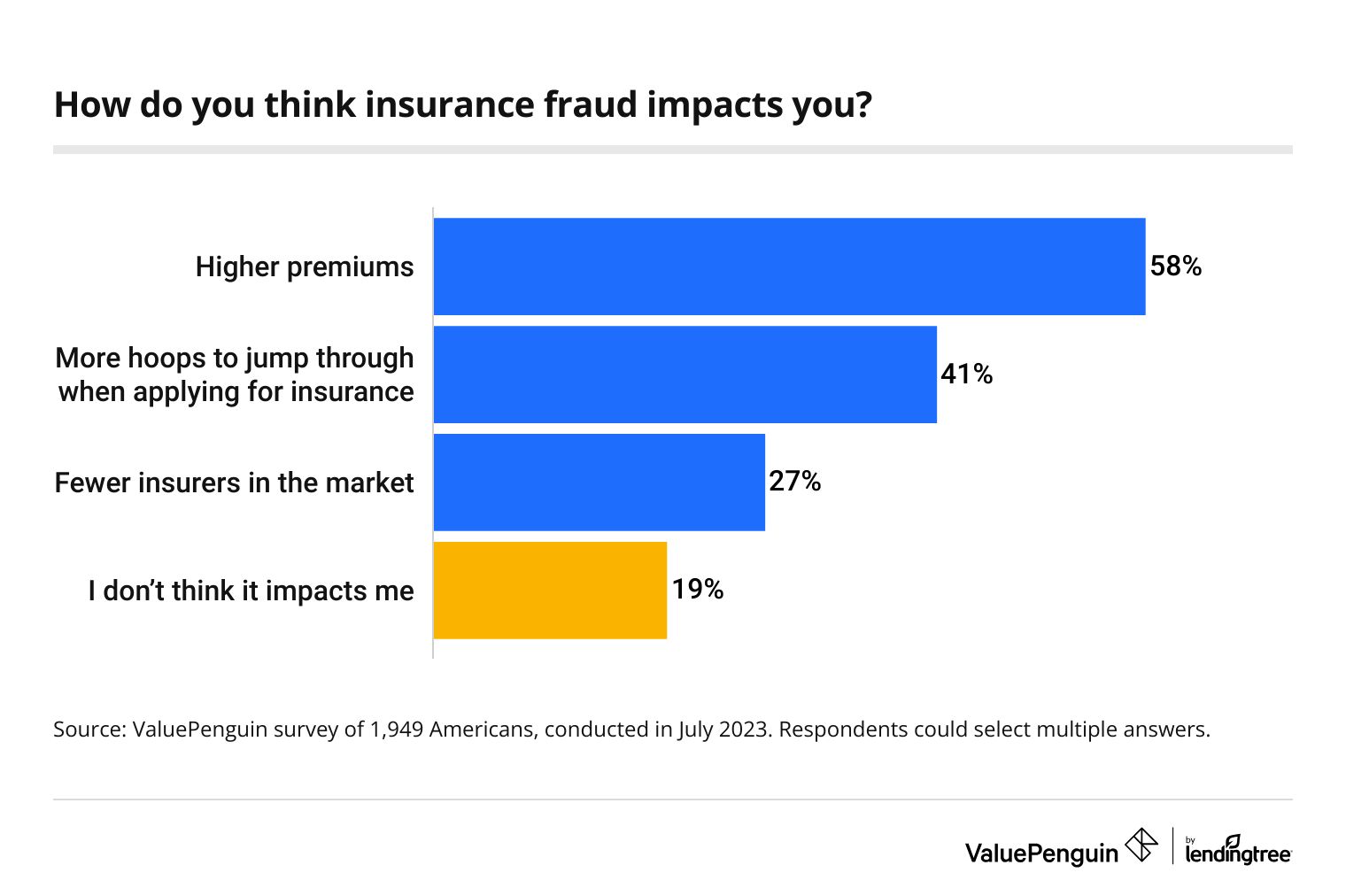Auto Insurance
Little White Lies or Insurance Fraud? Americans Admit to Deceiving Insurers to Save Money

There’s sometimes a fine line between cost-cutting and lawbreaking on insurance claims. According to the latest ValuePenguin survey of nearly 1,950 U.S. consumers, more Americans are crossing it.
However, these penny-pinching tactics may not be worth the potential price tag, namely because they could be considered insurance fraud, ValuePenguin insurance expert Divya Sangameshwar says.
"Whether you do it knowingly or unknowingly, you’ll face consequences that can range from higher premiums to denied claims to canceled policies to difficulty obtaining another policy in the future to potential criminal charges depending on the scope of your fraud," she says. "If you think you have misled your insurer accidentally, it’s best to come clean as soon as possible — preferably before you file a claim."
Keep reading to learn which truths Americans are stretching and what the implications may be.
On this page
- Key findings
- A handful of Americans admit to deceptive insurance tactics
- Millennials are the most likely to deceive auto insurers
- Young Americans are the most likely to mislead home insurers
- Defrauding insurers can have negative implications
- Avoiding accidental insurance fraud: Top expert tips
- Methodology
Key findings
- Most Americans say they’ve never committed insurance fraud, but some admit to questionable savings tactics. While just 9% of auto insurance and 15% of home insurance policyholders admit to committing insurance fraud, some don't realize filing false claims or misleading insurers could be fraud. In fact, 35% of auto insurance and 33% of home insurance policyholders have submitted claims for preexisting damage. Additionally, 21% of auto insurance and 30% of home insurance policyholders have misled their insurers to save money.
- Younger Americans are more likely to mislead insurers, intentionally or otherwise. 39% of millennial auto insurance policyholders admit to using deceptive tactics to save money on their insurance, compared with just 3% of baby boomers. Millennials’ most common tactics are using another address to get a favorable rate (16%), reporting their vehicle as stolen to cash in (15%), not reporting all the people who drive their car (15%) and reporting they use their vehicle less than they do (15%).
- Among millennials, the deception extends to their home insurance policies. 53% of millennial home insurance policyholders say they intentionally lied or chose not to disclose certain information to insurers. Most commonly, 20% didn’t disclose they owned a risky dog breed, 14% said they had safety features (such as alarms and smoke detectors) they didn’t and 14% failed to disclose they owned a pool.
- Intentions aside, younger Americans aren’t fully aware of the implications of defrauding insurers. Gen Zers are more than four times as likely as baby boomers to say they don’t consider insurance fraud a crime — 26% versus 6%, respectively. While 25% of Gen Zers don’t think insurance fraud impacts them, 58% of Americans say it could lead to higher premiums. Additionally, 41% of Americans believe fraud creates more hoops to jump through when applying for insurance policies and 27% correctly identify that insurance fraud may lead to less market competition.
A handful of Americans admit to deceptive insurance tactics
While the majority of Americans claim they’ve never committed insurance fraud, many say they’ve been deceptive while filing a claim. Overall, 9% of auto insurance and 15% of home insurance policyholders admit to committing insurance fraud — though younger Americans are more likely to admit it than older Americans.
Among auto insurance policyholders, 21% of millennials ages 27 to 42 admit to committing fraud — the highest by age group. That compares with:
- 4% of Gen Xers ages 43 to 58
- 1% of baby boomers ages 59 to 77
Among home insurance policyholders, millennials again lead, with 30% admitting to filing a fraudulent claim. That’s followed by:
- 11% of Gen Xers
- 1% of baby boomers
Note: While Gen Zers ages 18 to 26 are included in our overall figures, there were too few auto insurance and home insurance policyholders in this age group to highlight them separately.
Still, many Americans may not realize that they’ve committed insurance fraud. In fact, 35% of auto insurance and 33% of home insurance policyholders have submitted claims for preexisting damage, despite this being considered insurance fraud.

Men are significantly more likely to file claims for preexisting damage than women. While just 29% of female auto insurance policyholders and 24% of female home insurance policyholders have filed a claim for preexisting damage, those percentages rise to 40% among male auto insurance policyholders and 37% among male home insurance policyholders.
That’s not where it ends, either. If given the opportunity to submit a claim in the future, 31% of auto insurance and 34% of home insurance policyholders would include preexisting damage in their claims.
Overall, 21% of auto insurance and 30% of home insurance policyholders have misled their insurers to save money, but more on that below.
Millennials are the most likely to deceive auto insurers
Whether they know what they’re doing, younger Americans are particularly likely to stretch the truth with their auto insurers. In fact, 39% of millennials with auto insurance admit to using deceptive tactics to save money on it. That compares with just 16% of Gen Xers and 3% of baby boomers.
According to Sangameshwar, this may boil down to a lack of awareness. "Younger people are less likely to understand what insurance fraud is and the consequences of it," she says. "As they get older and hear about their peers facing consequences for misleading their insurers, their tolerance for insurance fraud will decrease."
What specifically are these millennials doing to deceive their auto insurers? Of this age group, 16% have used another address to get a favorable rate — making it the top tactic. Following that, 15% have reported their vehicle as stolen to cash in, 15% admit to not reporting all the people who drive their car and 15% admit to reporting they use their vehicle less than they do.

How does that compare to the general population? Across all auto insurance policyholders:
- 9% have used another address to get a favorable rate
- 8% didn’t report all the people who drive their car
- 8% have reported their vehicle as stolen to dispose of it and cash in
- 8% have reported they use their vehicle less than they do
- 4% have reported a fake accident to repair wear and tear on their car
Overall, though, 79% of auto insurance policyholders say they’ve never done any of the above to save money.
What’s more, 60% of millennial auto insurance policyholders say they’ve submitted a claim for preexisting damage to their car. In comparison, just 27% of Gen Xers and 14% of baby boomers have done this. And if given an opportunity, 52% of millennial auto insurance policyholders say they’ll submit a claim for preexisting damage in the future, while just 23% of Gen Xers and 12% of baby boomers say the same.
Young Americans are the most likely to mislead home insurers
When it comes to homeowners insurance policyholders, millennials again are the most likely to mislead their insurance providers. Among millennial policyholders, 53% say they intentionally lied or chose not to disclose certain information to their home insurers. That compares with 23% of Gen Xers and 3% of baby boomers.
Most commonly, millennials say they didn’t disclose they owned a risky dog breed at 20%. Following that, 14% said they had safety features (like alarms and smoke detectors) they didn’t and 14% failed to disclose they owned a pool.

Meanwhile, across all homeowners insurance policyholders:
- 11% didn’t disclose they own a risky dog breed
- 8% didn’t disclose a trampoline
- 8% didn’t disclose a pool
- 7% didn’t disclose previous claims when signing up for a new policy
- 7% said they had a security system they didn’t
- 7% said they had safety features they didn’t
- 6% said they concealed their residence is used as a rental or in a commercial business
- 5% asked a repair person to "cover the deductible" by increasing their estimate or bill
- 3% undervalued their property on the insurance application
- 3% overstated the value of stolen items in a home burglary claim
Meanwhile, 7 in 10 (70%) home insurance policyholders say they’ve never done any of the above to save money.
Millennial policyholders are also significantly more likely to submit claims for preexisting damage to their homes at 62%. Comparatively, just 22% of Gen Xers and 5% of baby boomers say similarly. If given an opportunity, 57% of millennial home insurance policyholders would submit a claim in the future for preexisting damage — significantly higher than the 29% of Gen Xers and 9% of baby boomers who say similarly.
Defrauding insurers can have negative implications
While stretching the truth on an insurance claim may seem harmless to save a quick buck, that’s not necessarily the case — though many Americans don’t realize that. In fact, 15% don’t consider insurance fraud to be a crime, with the highest percentage among Gen Zers at 26%. Comparatively, just 6% of baby boomers say similarly.
Additionally, 19% of Americans don’t think insurance fraud impacts them, with the highest percentage among Gen Zers at 25%. However, 58% of Americans say insurance fraud could lead to higher premiums and 41% believe fraud creates more hoops to jump through when applying for insurance policies. Meanwhile, 27% correctly identify that insurance fraud may lead to less market competition.

According to Sangameshwar, that’s largely because fraudulent claims are expensive. "Insurance fraud leads to higher costs for insurers, which they pass on to consumers in the form of higher premiums," she says. "It can also lead to a scenario where insurers may decide to stop underwriting policies altogether in an area where they feel there’s a high incidence of fraud, leading to less competition and higher rates for consumers."
Just how expensive are fraudulent claims? According to another ValuePenguin analysis on insurance fraud, not including a driver on a car insurance policy causes insurers to lose $10.3 billion annually. Meanwhile, underestimating the number of miles driven costs insurers $5.4 billion annually and using a false address costs $2.9 billion annually.
Those who believe insurance fraud impacts them may be speaking from experience. Among auto insurance policyholders, 20% have been a victim of auto insurance fraud. That could include staged accidents, windshield replacement rip-offs, towing scams, counterfeit air bags, agent fraud, exaggerated garage repair costs or inflated claims from the other parties.
Additionally, a quarter (25%) of home insurance policyholders say they’ve been a victim of home insurance fraud. That could include roof replacement scams, price gouging by contractors seeking more money from insurers, fake inspectors or storm scammers.
Compared to other crimes like tax fraud or theft, 61% of Americans think insurance fraud is an equally bad crime that needs equal punishment. Meanwhile, 22% think insurance fraud is a minor crime that needs minimal punishment and 11% think it’s a worse crime that needs harsher punishment. Just 6% say it’s not a crime that needs punishment.
When asked what they think the consequences are for those who commit insurance fraud, 51% of Americans say fraudsters receive fines — the most popular response. Following that:
- 45% say they lose coverage
- 43% say they receive felony charges
- 40% say they receive jail time
- 32% say they have higher premiums
- 28% say they are charged with a misdemeanor
- 25% say they receive insurance premium penalties
According to Sangameshwar, all of these penalties are possible if you commit fraud — it just depends on what type of fraud you commit.
"Insurance fraud is a form of stealing, and it’s illegal in every state," she says. "Most insurance fraud is categorized as hard or soft fraud. Hard fraud occurs when a person purposely destroys property in an attempt to collect on the insurance policy, and it often involves very large sums of money. This is a very serious crime that leads to felony charges, hefty fines and even jail time."
Soft fraud — the more common form — occurs when a person exaggerates a legitimate claim or intentionally lies about information on an application. "Soft fraud can be harder to detect and prove since it’s often a legitimate mistake or a crime of opportunity," she says. "However, if the authorities go after you for soft fraud, you could face misdemeanor charges and punishment like restitution, community service and probation."
Avoiding accidental insurance fraud: Top expert tips
While consumers may have gotten away with fraud in the past, the rising number of fraudulent claims has led to increased vigilance among insurers. In fact, insurers are using technology like fraud detection software, drones and satellites, meaning it will become almost impossible to lie to or mislead your insurer to save a few dollars.
If you don’t take steps to correct your mistake or omission and your insurer identifies it, Sangameshwar says it can impose consequences like premium penalties. Insurers can also cancel your policy because you’ve been flagged for fraud. Getting a new insurance policy after a policy cancellation for fraud can be harder and significantly more expensive.
If you’ve realized you accidentally filed a claim incorrectly, though, Sangameshwar says it’s not the end of the world.
"We’re all human beings — and sometimes we make mistakes," she says. "For example, you may have forgotten to let your insurer know that you’re driving more miles in 2023 compared to 2022 when you were working from home. If you accidentally forgot to include some information or provided incorrect information about your home or car when applying for insurance, contact your insurer’s customer service or your insurance agent as soon as you realize the mistake to let them know about the error."
While this could lead to higher premiums for you, Sangameshwar says it’s better to be upfront about issues like this to avoid being flagged for fraud.
Methodology
ValuePenguin commissioned QuestionPro to conduct an online survey of 1,949 U.S. consumers ages 18 to 77 from July 17 to July 24, 2023. The survey was administered using a nonprobability-based sample, and quotas were used to ensure the sample base represented the overall population. Researchers reviewed all responses for quality control.
We defined generations as the following ages in 2023:
- Generation Z: 18 to 26
- Millennial: 27 to 42
- Generation X: 43 to 58
- Baby boomer: 59 to 77
